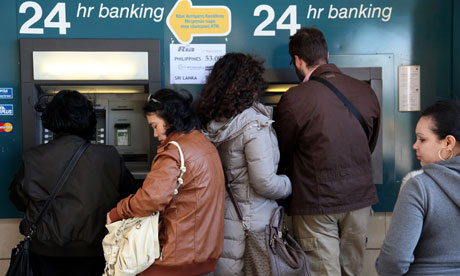By Kim Gittleson
It is a cliche used from Bond to Bourne: the classic spy image of a suitcase filled with cash and multiple passports for a quick getaway. But increasingly it is not spies that are looking for a second passport, but a growing number of "economic citizens".
Henley and Partners citizenship expert Christian Kalin, who helps to advise clients on the best place to spend their money, estimates that every year, several thousand people spend a collective $2bn (£1.2bn; 1.5bn euros) to add a second, or even third, passport to their collection.
"Just like you diversify an investment portfolio, you want to diversify your passport portfolio," he says. The option has proven popular with Chinese and Russian citizens, as well as those from the Middle East.
Cash-strapped countries have taken notice. In the past year alone, new programmes have been introduced in Antigua and Barbuda, Grenada, Malta, the Netherlands and Spain that either allow direct citizenship by investment or offer routes to citizenship for wealthy investors.
However, concerns have been raised about transparency and accountability.
In January, Viviane Reding, vice-president of the European Commission, said in a speech: "Citizenship must not be up for sale."
But for now, at least, it seems that those with money to spare are in luck, with half a dozen countries offering a direct citizenship-by-investment route with no residency requirements.
Essentially, citizenship that is very much for sale.
Dominica
By far the cheapest deal for citizenship is on the tiny Caribbean island of Dominica.
For an investment of $100,000 plus various fees, as well as an in-person interview on the island, citizenship can be bought.
However, experts caution that because the interview committee meets only once a month, actually getting a Dominican passport can take anywhere from five to 14 months.
Since Dominica is a Commonwealth nation, citizens get special privileges in the UK, and citizens can also travel to 50 countries, including Switzerland, without a visa.
St Kitts and Nevis
The Caribbean islands of St Kitts and Nevis have the longest running citizenship-by-investment programme (CIP) in the world, which was founded in 1984.
There are two methods to obtain citizenship, with the cheapest option being a $250,000 non-refundable donation to the St Kitts and Nevis Sugar Industry Diversification Foundation, a public charity. A second option involves a minimum $400,000 investment in real estate in the country.
The programme has recently been singled out by the US Treasury, which cautioned that Iranian nationals could be obtaining passports and then use them to travel to the US or make investments, which could violate US sanctions. (St Kitts closed its programme to Iranians in December 2011.)
However, Mr Kalin of Henley and Partners, which helped to set up the programme, says that while the programme has its issues, "St Kitts is relatively well run - it's in a way a model."
He adds that Caribbean locations are good for interim passports for "global citizens" who are looking to eventually establish themselves via investments in other "economic citizenship" programmes like those in Portugal or Singapore.
Antigua and Barbuda
Antigua and Barbuda introduced its CIP in late 2013, with similar parameters to the St Kitts model: a $400,000 real estate investment or a $200,000 donation to a charity.
In a speech announcing the programme, Prime Minister Baldwin Spencer cited a common reason that countries have increasingly introduced CIPs: an economic slowdown and "the virtual disappearance of traditional funding sources".
He cited both the St Kitts example as well as the United States, which allows foreigners to obtain a green card under the EB-5 visa if they invest $500,000 in a "targeted employment area" and create 10 jobs. (Since 1990, foreigners have invested more than $6.8bn and the US has given out 29,000 visas through the EB-5 programme, although there is a yearly cap of 10,000.)
However, Mr Spencer also said: "The Antigua and Barbuda Citizenship by Investment Programme is not an open-sesame for all and sundry."
Malta
"Citizenship-by-investment programmes are certainly on the rise, especially in Europe," says University of Toronto law professor Ayelet Shachar.
The tiny nation of Malta recently came under fire when it announced plans to allow wealthy foreigners to obtain a passport for a 650,000 euro investment with no residency requirement, which would have made it the cheapest European Union (EU) nation in which to purchase citizenship.
Prime Minister Joseph Muscat estimated about 45 people would apply in the first year, resulting in 30m euros (£24m; $41m) in revenues.
After pressure from EU officials, officials changed the rule to require potential passport holders to reside in Malta for a year and raised the investment to 1.15m euros.
The uproar exposed rising tensions over the definition of citizenship, according to Prof Shacher.
"At stake is the most important and sensitive decision that any political community faces: how to define who belongs, or ought to belong, within its circle of members," she says.
"The heft of the applicant's wallet is the new answer, according to citizenship by investment programmes. This is in breach of our standard naturalisation and citizenship requirements that focus on establishing a genuine link between the individual and the new home country."
Cyprus
Cyprus is the other EU nation to offer a direct citizenship-by-investment route.
The cost of the programme was slashed to 2m euros in March, partially in an effort to placate mostly Russian investors who lost money when Cyprus was forced to accept a strict European Union bailout.
(The 2m euro figure applies when one invests as part of a larger group whose collective investments total more than 12.5m euros; an investment of 5m euros in real estate or banks is still required for an individual.)
But Mr Kalin cautions against a Cypriot investment, noting that the programme initially cost 28m euros, then 10m euros, then 5m euros.
"It's a good example of how not to do it - you bring a product to market and totally misprice it and it gets cheaper every six months. It is ridiculous," he says.



